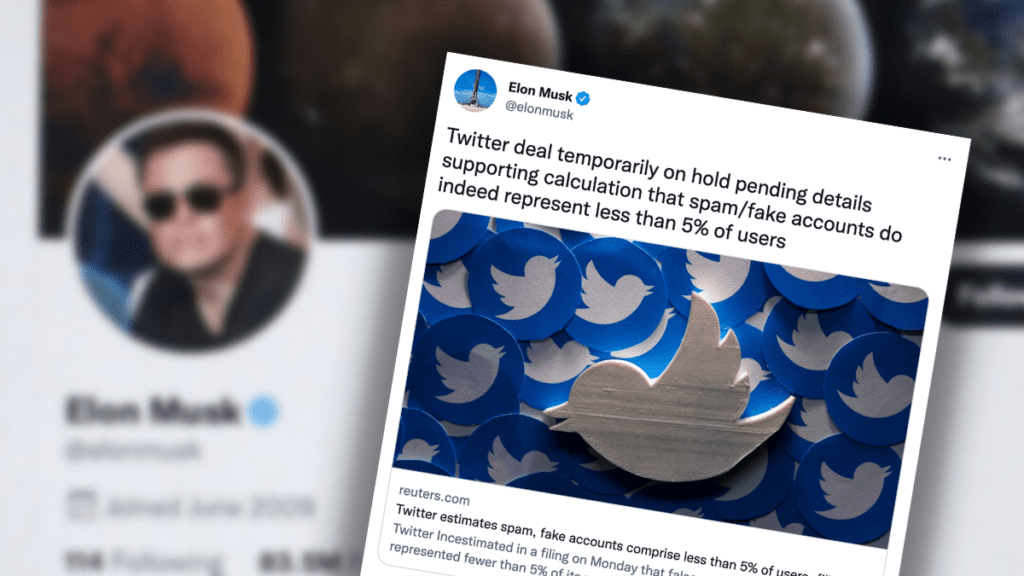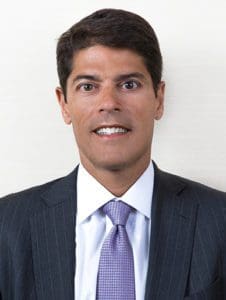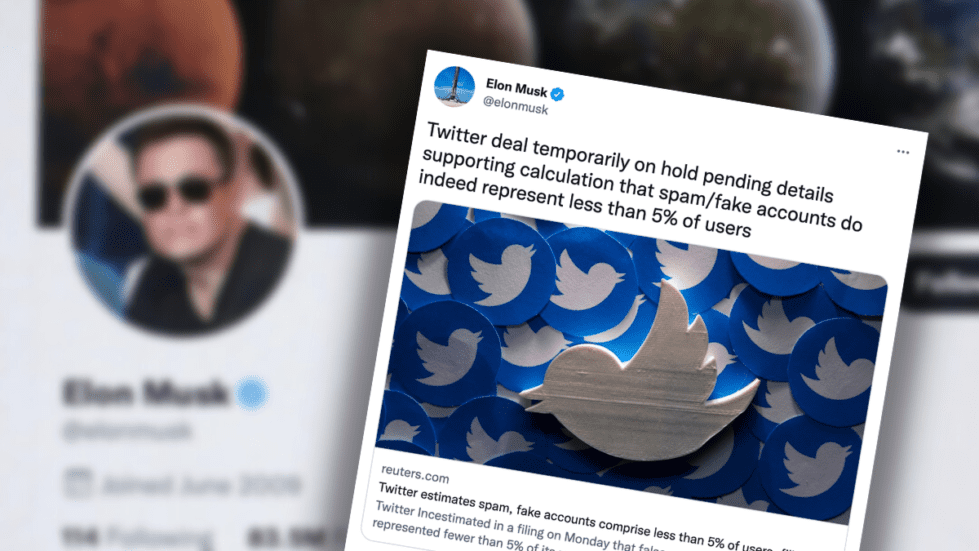

Charlie Megginson/Delaware LIVE graphic. Screenshots from Elon Musk’s public Twitter profile.
A Delaware judge ruled Tuesday that social media behemoth Twitter Inc. and the world’s richest man, Elon Musk, will face off in a five-day trial beginning in October.
Attorneys for Twitter asked Chancellor Kathaleen St. Jude McCormick to grant an expedited trial in the company’s lawsuit against Musk.
Twitter sued Musk in the Delaware Court of Chancery after he announced his intention to pull out of a $44 billion acquisition deal signed in April.
Twitter deal temporarily on hold pending details supporting calculation that spam/fake accounts do indeed represent less than 5% of usershttps://t.co/Y2t0QMuuyn
— Elon Musk (@elonmusk) May 13, 2022
Musk said on July 8 that he would no longer go forward with the purchase because he believed Twitter breached their agreement by refusing to crack down on spam accounts and disclose how many accounts were run by bots.
In a virtual hearing Tuesday, Twitter attorney William Savitt asked for a four-day trial beginning Sept. 19.


William Savitt is the co-chair of the Litigation Department of Wachtell, Lipton, Rosen & Katz. He is representing Twitter in its lawsuit against Elon Musk.
Savitt said the uncertainty surrounding the acquisition “inflicts harm on Twitter every day,” and “the earliest possible trial date is imperative.”
“Musk has been and remains contractually obligated to use his best efforts to close this deal,” Savitt said. “What he’s doing is the exact opposite — it’s sabotage.”
Savitt argued that Musk is looking to “conjure an exit ramp for a deal that doesn’t have one,” and that Musk’s complaint about spam accounts was manufactured only as a pretext to justify a wrongful termination of the acquisition agreement.
“He raised it as a problem only after the markets turned negative and the merger became less attractive to him financially,” Savitt said. “Buyer’s remorse can be an overused phrase, Your Honor, but it sure looks like what we have here, and the false accounts issue appears to be the vehicle.”
Savitt told McCormick he suspects “Musk wants to delay the trial long enough to ever really face a reckoning.”
“We suspect he wants to keep Twitter under massive pressure to continue his onslaught of criticism in the hopes of wearing Twitter down or running out the clock — or increasing his leverage,” he concluded.
Savitt noted that the contract between Twitter and Musk includes a “drop-dead date” of Oct. 24, 2022.
A drop-dead date is a firm deadline set in the contract that, if unmet, will result in some form of consequences.
Andrew Rossman, Musk’s attorney, said the contract stipulates that the drop-dead date is automatically stayed if either party files litigation, rendering the need to conclude litigation prior to Oct. 24 moot.


Andrew J. Rossman is a managing partner of Quinn Emanuel’s New York office and a go-to lead trial lawyer for complex commercial litigation involving mergers and acquisitions. Rossman represents Musk in Twitter’s lawsuit.
Rossman said Twitter’s proposed timeline would not give either side enough time to prepare for trial or for the court to come to a fair judgment.
Instead, Musk’s team asked for a ten-day trial beginning in Feb. 2023. That would give them more time to analyze the data Twitter conveyed relating to spam accounts, Rossman said.
A February trial date would still have been an expedited timeline, Rossman argued, and that’s necessary because Musk stands to gain nothing by dragging the matter out longer than necessary.
“The limbo is neither to the benefit of the seller nor the buyer,” he said. “Mr. Musk has arguably more risk at stake than Twitter does. If he ends up being forced to buy this company, he doesn’t have an incentive to keep this hanging for a long time.”
Rossman said Twitter only wants an expedited trial so that they can continue to conceal the actual number of spam and bot accounts using the platform.
They want to do that “as long as is necessary to get this deal railroaded through and force Mr. Musk to close,” Rossman said.
As to Twitter’s claim that Musk is causing the company irreparable harm, Musk’s attorney said “Twitter is creating its own chaos and shouldn’t come to court asking for relief on that basis.”
In support of that allegation, Rossman said the New York Times had a copy of Twitter’s lawsuit before he did, suggesting the company leaked it to put pressure on Musk.


The Honorable Chancellor Kathaleen St. J. McCormick was sworn in as Chancellor of the Court of Chancery on May 6, 2021. She is the court’s first female chancellor.
After a ten-minute break, McCormick delivered her ruling.
“Typically, the longer the merger transaction remains in limbo, the larger the cloud of uncertainty cast onto the company and the greater the risk of irreparable harm to sellers and to the company itself,” she said.
McCormick said that while she is convinced that Oct. 24 is not a hard and fast deadline, the mere fact that there is some flexibility does not mean that the court must or should prolong the matter.
“The reality is that delay threatens irreparable harm to the seller,” she said. “The longer the delay, the greater the risk.”
McCormick’s ruling for a five-day trial in October is closer to Twitter’s request for a four-day trial in September, though it does give Musk’s attorneys — who wanted a ten-day trial in February — a bit more time.
“Suffice it to say, in my view, the defendants underestimate the ability of this court … to quickly process complex litigation,” she added.
McCormick said that if it becomes apparent that a five-day trial will not be sufficient to resolve the matter, she will entertain a request to increase the number of trial days, though she’ll consider that request “with great skepticism.”
She asked if either counsel had any questions. They did not, and McCormick adjourned the hearing.
What is the Delaware Court of Chancery?
The Court of Chancery is considered the preeminent forum to decide disputes between corporations and other business entities.
At least one of the parties in any case before the court must be registered in the state of Delaware. Twitter, along with more than 60% of Fortune 500 companies, is registered in Delaware.
The Court of Chancery was established in 1792 and has since become a preferred forum for corporations hoping to resolve disputes quickly with a judge but no jury.
It’s a court of equity, which means it has the power to compel an entity, by injunction, to do something or stop doing something. In Musk’s case, Twitter hopes the court will enter an order to make him buy the company.
What does the lawsuit say?
The suit says that when Musk entered the binding merger agreement, he promised to use his best efforts to get the deal done.
“Now, less than three months later, Musk refuses to honor his obligations to Twitter and its stockholders because the deal he signed no longer serves his personal interests,” Twitter claims.
“Having mounted a public spectacle to put Twitter in play, and having proposed and then signed a seller-friendly merger agreement, Musk apparently believes that he — unlike every other party subject to Delaware contract law — is free to change his mind, trash the company, disrupt its operations, destroy stockholder value, and walk away.”
The company says Musk began looking for a way out of the deal after the merger agreement was signed and the market subsequently fell.
Rather than bear the cost of the market downturn, which Twitter says the agreement requires, Musk wants to pass the burden onto Twitter’s shareholders, the suit says.
“This is in keeping with the tactics Musk has deployed against Twitter and its stockholders since earlier this year, when he started amassing an undisclosed stake in the company and continued to grow his position without required notification.
“It tracks the disdain he has shown for the company that one would have expected Musk, as its would-be steward, to protect. Since signing the merger agreement, Musk has repeatedly disparaged Twitter and the deal, creating business risk for Twitter and downward pressure on its share price.”
Twitter alleges that Musk concocted the spam/bot account reasoning for abandoning the deal as a way to abdicate his duty to complete the purchase.
“In his press release announcing the deal on April 25, 2022, Musk raised a clarion call to ‘defeat the spam bots. But when the market declined and the fixed-price deal became less attractive, Musk shifted his narrative, suddenly demanding ‘verification’ that spam was not a serious problem on Twitter’s platform, and claiming a burning need to conduct ‘diligence’ he had expressly forsworn.”
Twitter calls Musk’s exit strategy “a model of hypocrisy.”
The company asks the court to order Musk to perform his obligations under the merger agreement and consummate the closing in accordance with the terms of the merger agreement.
In its response Friday, Musk’s team called Twitter’s request an “extreme expedition” and claimed the matter is “extremely fact and expert intensive, requiring substantial time for discovery.”
Musk has appeared before the Chancery Court once before. According to The News Journal, Musk testified in Wilmington about Tesla’s 2016 acquisition of SolarCity.
Chancery Court rulings can be appealed to the Delaware Supreme Court.
What’s next?
McCormick did not set a date for the trial other than to say it will be held in October 2022. Both sides’ legal teams will work with the court to set a date.
The trial is set to take five days, though McCormick indicated she would entertain a motion to extend the trial “with great skepticism.”
Read the Twitter v. Elon Musk lawsuit in its entirety here:


Charlie Megginson covers government and politics for Delaware LIVE News. Reach him at (302) 344-8293 or [email protected]. Follow him on Twitter @cmegginson4.
Share this Post


